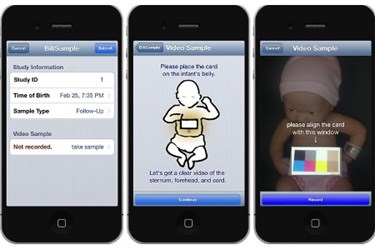BiliCam: A Smarthone App For Diagnosing Jaundice In Newborns
By Chuck Seegert, Ph.D.

Blood testing is the current gold standard for diagnosing newborn jaundice, a condition that affects many children but can become severe and require treatment. Now, a new smartphone application developed by University of Washington (UW) engineers may help parents or healthcare workers determine if a blood test is necessary.
Newborn jaundice develops when a baby isn’t eliminating enough bilirubin, a byproduct of red blood cell breakdown that is usually eliminated by the liver. Yellow skin is the telltale sign of jaundice; however, gauging the condition visually is a subjective assessment. If the severity is misjudged, and more extreme jaundice isn’t treated, it can lead to brain damage or even death.
“Virtually every baby gets jaundiced, and we’re sending them home from the hospital even before bilirubin levels reach their peak,” James Taylor, a UW professor of pediatrics and medical director of the newborn nursery at UW Medical Center, said in a recent press release.
Blood testing is the only real way to understand the levels of bilirubin in circulation, though some facilities use noninvasive test equipment. Unfortunately this equipment is expensive and often not readily available. To fill this need, the UW team developed a smart phone app called BiliCam.
“This smartphone test is really for babies in the first few days after they go home. A parent or health care provider can get an accurate picture of bilirubin to bridge the gap after leaving the hospital,” Taylor said.
A smartphone with a flash and a color calibration card are used to take a photo of the baby’s torso. The card accounts for different skin colors and lighting conditions, and the data is sent to the cloud, where it can be analyzed using a machine-learning algorithm. The outcome of the analysis is delivered almost immediately back to the parent via the smartphone, helping them decide if the baby needs to get a blood test or have further evaluation.
“This is a way to provide peace of mind for the parents of newborns,” said Shwetak Patel, UW associate professor of computer science and engineering and of electrical engineering. “The advantage of doing the analysis in the cloud is that our algorithms can be improved over time.”
The accuracy of the test was shown in a preliminary test group of 100 infants, according a research paper recently published by the team. Comparing results from the BiliCam to traditional blood test demonstrated that the app was performing as well as current screening methods, though it can’t replace a blood test for accuracy.
“We’re really excited about the potential of this in resource-poor areas, something that can make a difference in places where there aren’t tools to measure bilirubin but there’s good infrastructure for mobile phones,” Taylor said.
Providing low-cost and rapid diagnostic tools to developing countries has recently been the subject of intense biomedical research. An article published previously on Med Device Online detailed a portable handheld instrument that provides a number of clinical tests for areas without fully developed laboratory infrastructures.
Image credit: University of Washington
